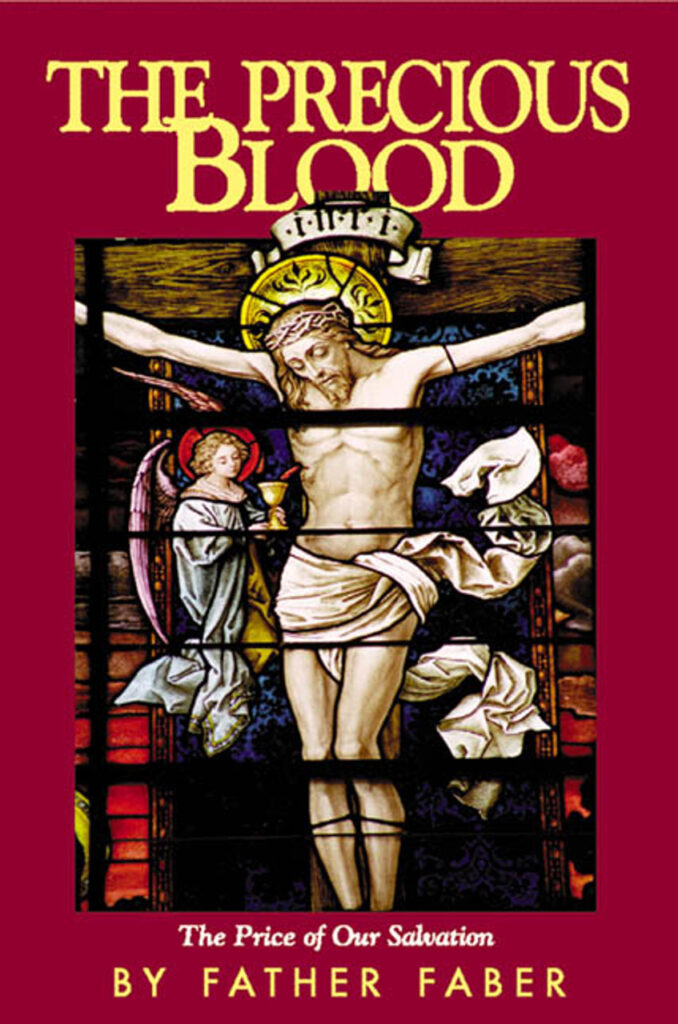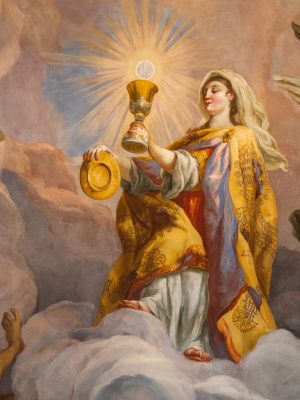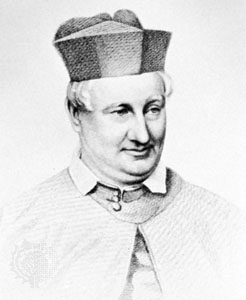The Empire of the Precious Blood
The life of God is very vast. It is a thing to be thought rather than to be spoken of, nay, to be seen in the mind rather than to be thought. It is very vast. It seems to grow vaster every day. We kneel down before it in our prayers, as a man might kneel to pray on a great seashore. God lies before us as an ocean of infinite life. We kneel upon the shore. But behind us rolls the same great ocean.
Suddenly it is at our right hand and on our left. We look upward, but the sky is gone. An ocean rolls where there was sky when we first knelt down to pray. The boundless waters stretch above us like a living canopy. The shore on which we kneel gives way. It is no shore. We are kneeling on the waters. The same eternal ocean rolls beneath us. We are hemmed in on every side by this ever-blessed ocean of infinite being. How full it is of burning life, how masterful, how soundless, how unchangeable!
The life of God is very vast. I feel it overawing me more and more, as I go on thinking of it. God is very simple. He is simply God. He is to be adored in his simplicity. His perfections are himself, and he is simply all his perfections. His perfections are not manifold. They are but one. He is himself his only perfection. His attributes are our ways of looking at him, of speaking of him, of worshipping him.
His perfections are not separate from each other, nor from himself. We cannot comprehend so simple a simplicity. We have not purity of understanding sufficient to apprehend so infinitely pure an idea. It is on this account that we take the idea of God to pieces in our own minds, and contemplate and love and worship him from a thousand points of view.
We have no other way of dealing with the incomprehensible. Speaking then of the divine perfections in this sense, it appears to me that none of his attributes call forth so much worship in my heart as his life. His life amazes me; and yet it melts me with love. He seems to me least like an infinitely perfect creature, when I contemplate him as life; and he is least like an infinitely perfect creature, he is most like the indescribable God. That view of him is less distinct than many others; but it appears to my mind more true on that very account.
The life of God is very vast. This is the thought which comes to me when I put before myself the empire of the Precious Blood. The life of God is blessedness in his own self. It is the joy of his unity, the fact of his simplicity. Once he was without creatures; and the calm jubilee of his immutable life went on. There could be no impulses in that which had had no beginning. His life started from no point, and reached to no point; therefore it could have no momentum: that is a created idea. He was imperturbable bliss. What can be more self-collected than immensity?
His infinite tenderness comes from his being imperturbable, though at first sight there seems to be contradiction between the two. When he was without creatures, they were not a want to him. His unbeginning life was unspeakably centered in himself, and so went on. He became, what he had not been before, a Creator. But no change passed upon him. All his acts had been in himself before: now he acted outside himself. But no change passed upon him. All his acts had been in himself before: now he acted outside himself. But no change passed upon him. Hitherto all his acts, which were the Generation of the Son and the Procession of the Holy Ghost, had been necessary: now his creative acts were free.
Still no change passed upon him. Still the calm jubilee of the unbeginning life went on. As it was before creation, so it was after it, a jubilant life of unutterable simplicity. These are things we can only learn by loving. Without love they are merely hard words. God worked, and then God rested. Nevertheless, that Sabbath of God, of which Scripture tells us, is a wonderful mystery, and one full of repose to toiling, seeking, straining creatures. What was that seventh day’s rest? To the untoiling Creator preservation is as much an effort as creation, and quite as great a mystery.
But even creation, the evoking of being out of nothing, was not suspended. Human souls are forever being created, created out of nothing. Perhaps new species of animals may be so also. What then was his rest? Perhaps new species of animals may be so also. What then was his rest? Perhaps it is only another name for that expansive love, which as it were arrested itself to bless its beautiful creation out of its extreme contentment and ineffable complacency.
Still the vast life of God goes on. He was free to create; and he made his creation free. Perhaps those two things have much to do with each other. He made himself an empire outside himself, and crowned himself over it, the kingliest of kings. God is very royal. Royalty is the seal which is set on all his perfections, and by which we see how they are one. He enfranchised his empire, and then began to reign. Still there was no change. His free people dethroned him. Oftentimes now in the depths of prayer the love of his saints beholds him sitting in dust and ashes an uncrowned king, as it were piteously.
But all this is embraced within his vast life without a shadow of change. It was part of the eternal idea of creation, that one of the Divine Persons should assume a created nature. The Second Person did so. He has carried it to heaven, and placed it in the bosom of the Holy Trinity for endless worship. This has displaced nothing. The vast life goes on. NO pulse beats in it. No succession belongs to it. No novelty happens to it.
The Precious Blood of the Son’s Human Nature would have been a pure beauty, a pure treasure of God, an unimaginable created life, if there had been no sins. But there was sin, and the destiny of the Precious Blood was changed. But there was no change in the divine life. The Precious Blood became the ransom for sin. The Precious Blood had to conquer back to God his revolted empire. It had to crown him again, and to be his imperial viceregent. What stupendous mutabilities are these!
Yet there is no change in the vast life of God. Its very vastness makes it incapable of change. It has no experiences. It goes through nothing. It cannot begin, or end, or suffer. It works while it rests; and it rests while it works; and it neither works nor rests, but simply lives, simply is. O adorable life of God! Blessed a thousand, thousand times be thou in the darkness of thy glory, in the incomprehensible sweetness of thy mystery!
This article is taken from a chapter in The Precious Blood: The Price of Our Salvation by Fr. Faber, which is available from TAN Books.









